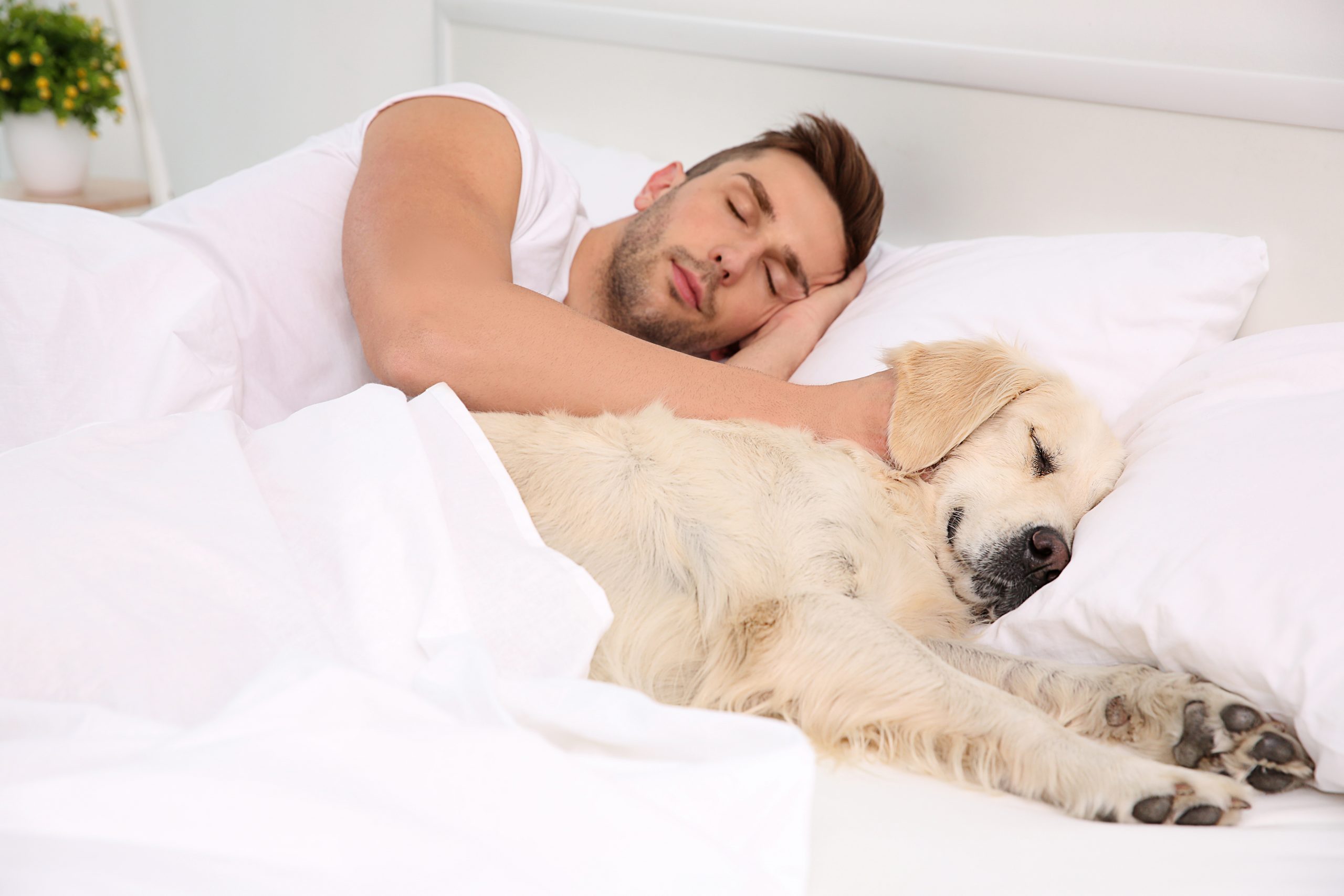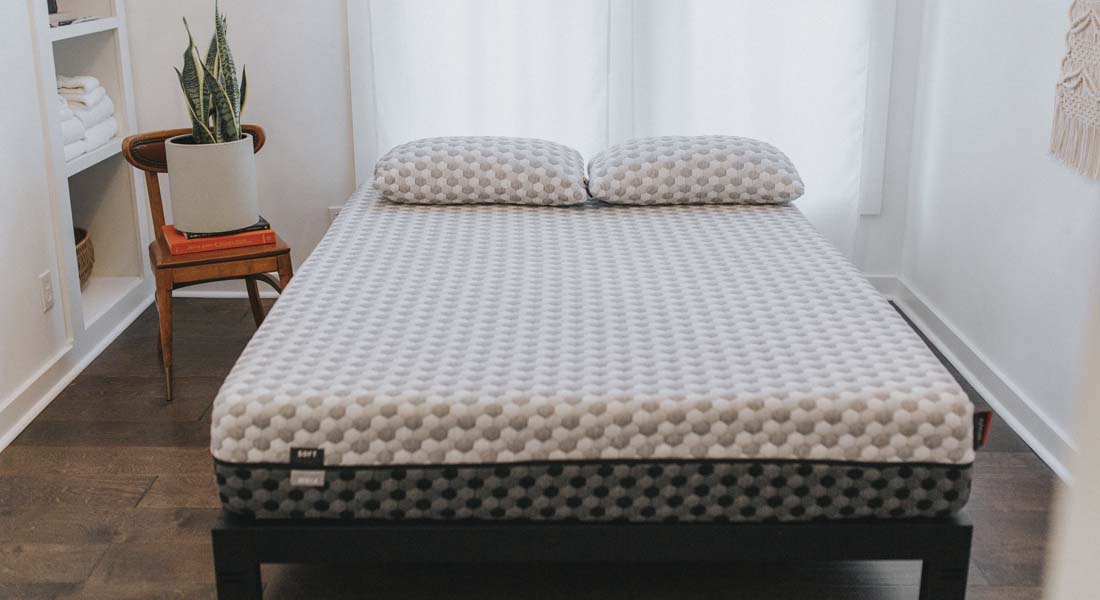With that said, experts believe some canine sleeping arrangements may not be best for their humans. Keep reading to learn more about why you may want to reconsider letting your dog sleep in bed with you.
Benefits of Letting Your Pet Sleep in Your Bed
Some pet owners are gone for the majority of the day because of work or social obligations, which means bonding time has to happen in the evening. As a result, many pet owners let their pups sleep in bed with them to make up for lost time during the day. Here are a few other reasons why pet owners enjoy their furry best friends with them in bed.
Safety
Plenty of dog owners treat their pets as though they’re guard dogs, even if they aren’t trained as such. Just the idea of having your pet close can bring you a sense of security and safety, something you might otherwise not have if they were elsewhere in the home.
Bonding
Nothing is more precious than the bond between a human and their furry best friend. Similar to a newborn and its parents, co-sleeping is beneficial for pets as well.
Sleep quality
One study found that women self-reported fewer sleep interruptions from sleeping with a dog in their bed than those who slept with a human in their bed.

The Drawbacks of Dogs in the Bed
While there are some good emotional reasons to let your dog sleep in your bed, there are some reasons to avoid it as well.
Sleep pattern interruption
Your dog might help you get to sleep on time (this would seem like a positive thing, right?), but if your dog is a light sleeper, wakes up too early, or has trouble getting settled down for the night, your sleep schedule could suffer because of it, and that could eventually impact your everyday life.
Just like us, dogs move around a lot in their sleep. They constantly shift positions, roll around in the blankets, and have difficulties settling back down; if you’re one of the lighter sleepers in the family, sharing a bed with your pooch probably isn’t right for either of you.
Bed hogging
It largely depends on the size of your dog, but if you’re someone who needs your space at night, your pup sleeping next to you won’t do you any favors. Most of the time, a dog wants to sleep next to their humans in one form or another, but it might prevent you from getting comfortable. If your dog is a bed hog, it might be ideal to find other arrangements.
Relationship consequences
Your partner could be open to the idea of your dog sleeping in bed with you, but it’s important to take them into consideration if this isn’t the case. Not everyone is a fan of dogs in the bed and it could certainly make your bedroom life less spontaneous with canine company constantly around.
Fleas, parasites and other diseases
One serious issue of pet co-sleeping is the risk of a flea infestation or exposure to other parasites. You never plan for your dog to get fleas, but it can happen. Not only does it affect them, but it can end up affecting you as well. Due to a dog’s scratching, fleas can become dislodged and end up in your sheets—or even on your skin— very easily if you share a bed. Be sure to keep your dog’s flea and tick prevention up to date to prevent these parasites from living on your dog in the first place.
Other parasites and diseases to watch for include: roundworms, hookworms, and zoonotic bacterial disease. To protect yourself and your family, make sure your dog is regularly taken for checkups at the veterinarian, be sure to wash your hands frequently, especially after touching an animal, and avoid contact with feces when possible.
If You’re an Allergy Sufferer…
Allergies to pets are relatively common, especially for those with asthma. There’s a common misconception that pet fur is the cause of allergies when, in fact, it’s the animal’s dander and saliva. Plus, if you have an outdoor pet, they’re likely to bring in all kinds of dirt and dust that will send your allergies into a frenzy.
If you allow your pet to sleep in bed with you, these things could be spread onto your mattress, therefore causing you to suffer from those sneezing fits and watery eyes. The best treatment for severe allergies is to remove all traces of pet dander from your home. Make sure to wash your sheets and bedding regularly. If you have carpet, it can act as an allergen trap, so switch to hardwood or other hard surfaces if possible.

Sleeping in Bed: Potential Dangers to Your Dog
We’ve talked about all the risks to humans, but dogs are just as much at risk when it comes to co-sleeping with their owners. People readjust and move around in their sleep without fully waking, so it could be dangerous to your dog if you were to roll over on them.
This is more of a concern for smaller dogs, but if your larger pet doesn’t readjust with you throughout the night, they’re potentially at risk as well. A smaller pet cannot handle the weight of a human laying on them and, unfortunately, might suffocate due to it.
Another danger they could face is falling off the bed. There are stories of this happening with parents who co-sleep with their babies, but it happens to dogs as well, especially smaller breeds. Depending on how far off from the floor your bed is, your pet could suffer from a serious injury to their neck or limbs.
The Best Rest Comes with Dog Off the Bed
The most thorough study on human and dog co-sleeping habits by the Mayo Clinic found that the dog owners that got the best rest were those that had their dog sleeping in the room with them, but not in their bed.
Just because your dog isn’t allowed in your bed anymore doesn’t mean it has to be a hard knock life for them! Using the Layla Dog Bed ensures that your pup is close by, bringing some added comfort to both you and your pet. Filled with sleep-enhancing memory foam to support their body weight, you might be jealous enough of their new sleeping arrangement that you invest in your own Layla mattress for yourself!



